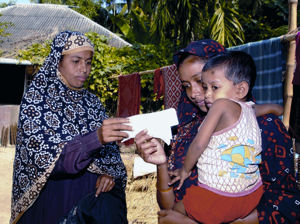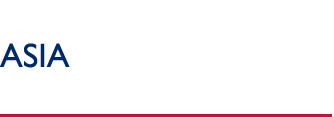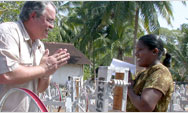Population, Health and Nutrition
 Female village worker with mother and child in Bangladesh. (Photo: JSI)
ASIA BUREAU HEALTH PROGRAMS
Afghanistan, Bangladesh, Burma, Cambodia, China, East Timor, Kazakhstan, Kyrgyzstan, India, Indonesia, Nepal, Pakistan, Philippines, Tajikistan, Turkmenistan, Uzbekistan and Vietnam
CONTACTS
Gary Cook
Senior Health Advisor
Tel: (202) 712-0707
Email: gcook@usaid.gov
Overview
About half of the world's maternal and child deaths take
place in Asia. HIV/AIDS is a growing threat, and tuberculosis, malaria and
avian influenza remain critical concerns. USAID is working with partners to improve health services
and systems, update policies, advise communities on healthy practices and
conduct research to further improve health.
Programs
Keeping Mothers and Their Children Healthy
Poor women without access to health care are particularly
vulnerable to health problems during pregnancy. A high percentage of women in
Asia are at risk of dying due to anemia and hemorrhaging during pregnancy and
childbirth. Using community outreach approaches and clinic care, USAID works to
increase the percentage of skilled birth attendants at delivery, an
intervention proven to save mothers' lives.
Neonatal conditions such as low birth weight are responsible
for about half of all deaths among children under age five in Asia, and Indian
children account for almost 20 percent of global neonatal deaths. USAID provides
technical and commodity assistance to expand basic health services and increase
access to nutrition supplementation for diarrhea. USAID addresses other
diseases that kill children by educating communities about hygiene and promoting
immunization. USAID
programs in Kyrgyzstan have trained health workers in basic epidemiological
skills, leading to improvements in vaccine administration.
Saving Lives with Family Planning
With nearly half the region's population under age 25 and
lacking family planning services, expanding sustainable services is critical. USAID's
continued investment in innovative family planning programs has led to
sustainable partnerships that leverage resources and increase access. A
USAID-funded project has partnered with the Nepal Contraceptive Retail Sales Company and the Nepal
Fertility Care Center to expand family planning service outlets in hard-to-reach
areas. As a result, more couples can choose when to have children,
which increases the chances of survival for both mother and child.
Fighting Infectious Diseases
There are
an estimated 4.9 million people with HIV in the Asia region. The
United States has made a five-year $18 billion commitment to fight HIV/AIDS
globally, and Vietnam is one of the program's 15 focus countries. Asia has half
of the world's tuberculosis burden and more than 1.3 billion people at risk of malaria; in some
countries, malaria parasites are resistant to almost all treatments. Since most
of the reported avian influenza (AI) cases in poultry and humans are in South
and Southeast Asia, USAID has large AI programs in many countries, including
Bangladesh, Indonesia and Vietnam. USAID programs strengthen the response capacity
of health systems and improve access to prevention, treatment and support services
for infectious diseases.
Back to Top ^
|




